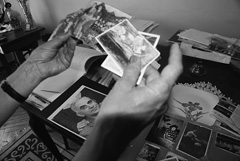Death of the Poet
Şairişi Ğura TURKEY / 2009 / Laz, Russian / Color / Video / 18 min
TURKEY / 2009 / Laz, Russian / Color / Video / 18 min
Director: Elif Ergezen
Assistant Directors: Aslı Ertürk, Hicran Yavuz
Photography: Jordane Chouzenoux
Assistant Camera: Gürkan Özkan
Sound: Mehmet Kılıçel
Sound Design: Nurkut Özdemir
Research: İsmail Avcı Bucakliși
Source: Elif Ergezen
The late Laz poet Hasan Helimisi drifted along the borders of Russia, Georgia, and Turkey in a life of exile. Helimisi’s daughter Narima traces her fading memories of her father through the voice recordings, photos, paintings, and poetry he left behind, testaments to the existence of the man who left her family when she was just a child. Standing on a swath of land called Sarpi, an area that straddles the border between Georgia and Turkey, she absorbs the wind, the smells, and the scenery that her father must have experienced. His vestige slowly emerges. A visual poem in which the feelings a daughter has for her father resonate with the father’s voice to evoke memory.
[Director’s Statement] I am a Laz! The Laz language is spoken in the Ajaria region of Georgia and northeastern Turkey. It unfortunately has ceased to be a commonly spoken language. It is actually in danger of disappearing. Today, most of the young Laz don’t speak their own language. Therefore I find myself experiencing the feelings of deficiency that have been felt by Narima, who cannot understand her father’s poems written in the Laz language. You can neither reincarnate your dead father nor learn your native language when it is too late. Thus you can’t laugh or cry in that language. So I asked myself: Who can describe the beauty of a language and its disappearance in a better way than its poet? I had to make a movie in Laz and I was guided by the life story of Hasan Helimisi, who put tremendous effort into keeping Laz language and culture alive, and the poems he read into a tape himself.
The production process coincided with the Russia-Georgia armed conflict. Here was Georgia, a liberal and US-backed country where both poverty and unconscious consumptive habits have no limit . . . I clearly saw the contrast between the past and today in Narima, who grew up in Soviet times. She was an orphan left by her father and by communism too. I believe she described her loneliness when she said, “I shall not depend on anyone.” So, in this movie, I wanted to bring together a communist father and a typical example of the new human model after the Soviet regime. I feel Narima’s anger, loneliness, and sadness, as well as the poet’s happiness in song and his love for freedom in choosing hardship over luxury.
 Elif Ergezen
Elif Ergezen
After graduating from the communications department of Galatasaray University in Istanbul, Elif Ergezen obtained a master’s degree in film from the University of Paris 1 Panthéon-Sorbonne in 2005. Her short film, Unconsciously, was completed in France in 2002, followed by a documentary, Yesterday, Elsewhere, in 2004 and another short, Departure, in 2006. Death of the Poet was completed in 2009 in Turkey. |
